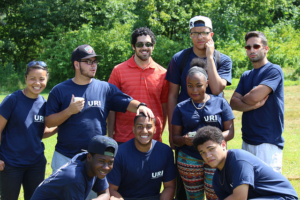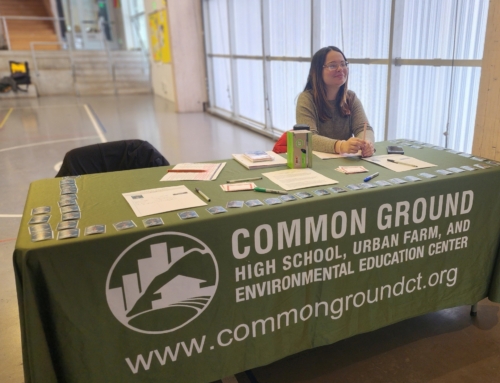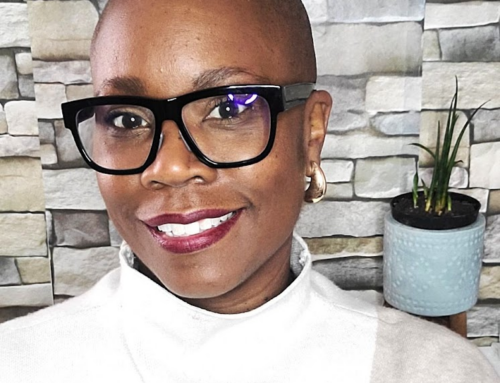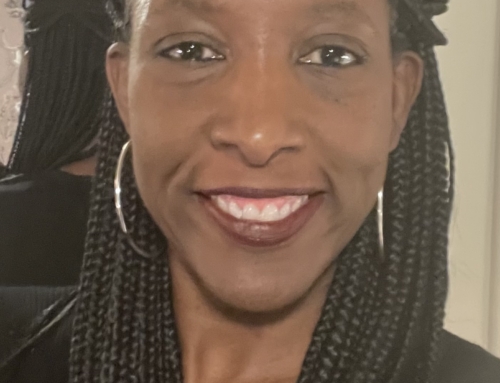By Tom Gaudioso
Green Jobs Corps Program Manager
At Common Ground, we have lots of hopes for our students: That they will graduate college ready, confident that they are up to the challenge of higher education. They will grow into powerful leaders and agents of change. They will lead healthy, fulfilling, sustainable lives.
Alongside these other goals, I really want every student at Common Ground to leave here with the skills and knowledge they need to be successful in their careers. And over the last few years, I’ve been working with other Common Ground staff to help students explore and prepare for the world of work.
One way every student does this is through Junior Career Exploration — part of our student’s experiences in their small, family-like guidance groups, which meet four times a week throughout a students’ four years at Common Ground. Once every eweek or two, juniors focus their guidance time on activities that foster exploration, both of self and potential career options. Topics include personality types, identity, work values, career research, and college exploration. Upon completing the program, students will have identified their top 3 career options and have deep knowledge of these career paths. Also, each junior will have attended a career exposure field trip, and written a reflection on a significant experience that has impacted them on a professional level. Both career exploration charts and students’ career exploration reflections go into their leadership portfolios — which means they’re a requirement for students to graduate.
Green Jobs Corps involves an even deeper dive into career exploration and preparation. Green Jobs Corps has two main pillars: Job placements and career development workshops.
In their job placements, Corps members are placed into seasonal or school-year long, paid or volunteer positions, where they take part in environmentally-related work, such as stewarding the farm and site, co-leading after school children’s’ programs, running local farmer’s markets, planting trees in New Haven neighborhoods, maintaining local school gardens and learning habitats, and more.
These placements are designed with students’ career development front and center. At the start of each work placement, students identify two areas in which they want to grow, and supervisors name another two skills they hope that young people will develop. They pick these skills from Common Ground’s school-wide leadership standards, which were developed by merging our home-grown POWER leadership framework with lists of 21st century skills that students need for work, learning, and life. At the start and end of each job, young people and supervisors rate Corps members’ skills in the four areas they’ve picked — so we can see how much growth young people are experiencing. Last year, 65% of Corps members grew in four of the five skills identified, and 95% improved in at least three of five areas.
Corps members take part in a 10-part career development workshop series, as well. Topics include self-Marketing, Networking, Resume, Cover Letter, Interview, Job Search/Application Process, and Personal Finance.
While not every student can participate in Green Jobs Corps, it is open to all, and reaches a lot of young people. Last year, for instance, 81 of our students completed at least one job placement, and our students took on a total of 142 different paid jobs. It made me particularly proud that 45% of last year’s graduating seniors chose to include Green Jobs Corps in their senior portfolio defense. That means nearly half of our students thought Green Jobs Corps was one of their two most important learning and leadership opportunities in high school.
Long-Term Impact
But does all this do what I hope for our students? Does Green Jobs Corps and other things we do at Common Ground put students on pathways to careers they will love?
This past summer, Common Ground worked with Marisa Vargas-Morawetz — a Yale Presidential Public Service Fellow — to help answer these questions. And they told us some pretty inspiring things. Curious to learn more? Read what she heard from program alumni here.








Leave A Comment